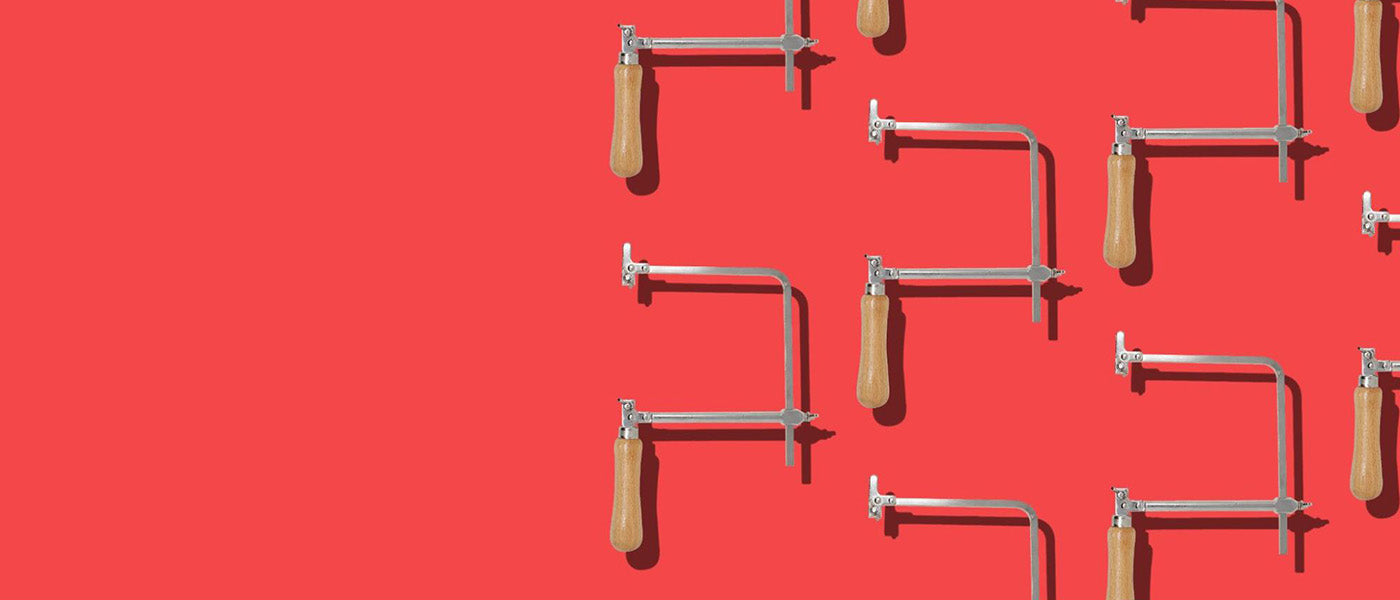
Essential Tools for Jewelry Making
As it tends to be with all hobbies, you can never have too many tools. Some tools are irreplaceable, others are specialized and used for very specific things and then there are others that are well rounded and great to have around the work bench. In this article we’ll be covering some of the basic tools used by DIY Jewelers.
The workbench
A comfortable and well lit place to work is essential, afterall, this is where you’ll be spending your free time - it’s ok to be particular about this “detail”. We like to cover our work surface with a large self-healing cutting mat. Whether it’s scrapbooking, cosplay or like in this case DIY jewelry making, a cutting mat is a great working surface. It protects the workbench tabletop so it lasts longer; it's great to cut on or paint on, and when it gets to the point where it’s “seen better days” - the cutting mat is replaceable.

Bench Vise
Lightweight, yet strong table vises are a great tool to have. The unique design allows for a 360 rotation and tilt to a 45 degree angle. Hold and position the jewelry piece you’re working so that your hands are free to carve, shape or detail. It easily attaches to the workbench and can just as easily be moved when needed.
Jeweler’s anvil
Much smaller than the average anvil and not quite as heavy as the one that always seems to land on Wile E. Coyote, the jewelers anvil is a must for metalsmiths. Made from steel with a very smooth surface, this is an essential item for hammering, forging and shaping metals.
Hammers
There are quite a number of hammers available to jewelers, each with a specific purpose. They include, but are not limited to mallets, goldsmith hammers, planishing hammers, riveting hammers, swiss style hammer, forming and texturing hammers. Some are even sold in sets.

Pliers
Another generally all around awesome tool for jewelry makers and that offers many specific options are pliers. In fact, we wrote a whole article about the many types of pliers and their uses, The Types of Pliers Every DIYer Should Know About .
Pliers are typically made from metals like carbon steel and often feature a soft cushioned cover on the handle part for grip and comfort. Also features a spring-actuated mechanism to auto open the plier when in use.
For jewelry making, commonly used pliers include round nose pliers, bent nose pliers, needle nose pliers and wire cutters, which is also a type of plier. These tools help to cut metal or plastic wire, shape and coil metal wires, hold metal for detailing or pick and hold beads for threading and more. They’re an essential tool with a multitude of uses.
Check out the entire Excel Blades selection of pliers.

Jeweler’s Saw
If you’re going to cut metal, you’re going to need a jeweler’s saw, it’s an essential tool to smoothly and quickly cut metals as well as wood, resin or other materials used in jewelry design.
Generally the saw has a wooden handle, a blade and a c-frame metal frame that is adjustable so it can fit a variety of blades. Two thumbscrews on top and bottom of the frame allow for quick change of a broken or dulled blade. Additional thumb screw at the end of the bottom arm is for adjusting the saw height to the blade height as well as adjusting the blade tension. Some saws are deeper, these can accommodate and saw through larger projects.

Needle Files
There are many types of files, in the jeweler’s studio, you’ll find needle files. Usually sold in sets of six or twelve and stored in a protective plastic pouch with individual slots for each file. This assures careful storage that prevents deterioration. They're made from high quality steel, which makes them strong and durable. Mini Needle Files measure about 4 inches in length, are versatile and help working on the fine details for tasks like gemstone settings. Essential for filing down bezel’s height and prong interiors assuring a secure and snug fit for the gemstone.
Needle files come in a few shapes like equaling file, round file or a triangle file. Names dictate the shape or the function. Equaling file refers to the equivalent rectangular geometric shape, where the opposite sides are equal to each other. This file is used for removing irregularities in rectangular or square shapes. A round needle file can be used to enlarge round holes
Can be used with or without a handle - collet with a tightening collar allows for the files to be removed and changed out quickly.
Browse all the needle files to find the right one for your project!

Sanding Sticks
Sandpaper got an upgrade! Sanding sticks are available in several grits including #80, #120 up to #600. The spring loaded mechanism allows for a quick and easy belt change once it’s used up. They’re long and narrow, and tapered to a point, which allows for precise sanding.

Drills
Intricate work requires precision tools like fine high speed drills. Bits sizes in sets can range from #60 through #80 to create the smallest openings.
We’ve got the tools you need for your next jewelry design project. Discover the collection here.